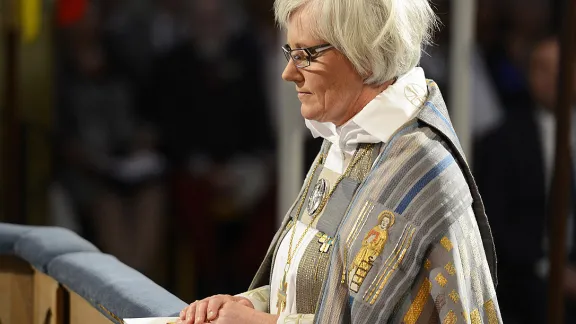
Archbishop of Sweden Antje Jackelén. Photo: Magnus Aronson/IKON
Stresses LWF Engagement in Climate Change, Sustainability and Ongoing Reformation
(LWI) – Antje Jackelén became the first female archbishop of the Church of Sweden at a ceremony in Uppsala in June 2014. German-born Jackelén, a bishop in Lund in southern Sweden, was elected to the post last October after winning 55.9 percent of the votes cast in the first round to choose a successor to outgoing Archbishop Anders H. Wejryd. Jackelén is a member of the Lutheran World Federation (LWF) Council, and serves on its Committee for Theology and Ecumenical Relations. The Church of Sweden is LWF’s largest member church, with over 6.5 million members.
In an interview with Lutheran World Information, Jackelén speaks about her first 100 days in office and some of the opportunities and challenges facing the Church.
How would you reflect on and describe your first 100 days in office as the Church of Sweden’s first female archbishop?
Admittedly, at least 35 of those were vacation, packing and relocation. Still, it has been an intense start. From many parts of society, I have experienced positive anticipation, which is also reflected in the large number of requests for interviews from the media. Ecumenically, I have been warmly welcomed as Church of Sweden's new archbishop and we have intensified the preparations for the Reformation jubilee. Internationally, the world has seen a terrifying development in Syria and Iraq and a humanitarian crisis that we must respond to.
Is it very important to you personally to see the Church of Sweden and the Lutheran World Federation taking the lead on issues such as climate change and sustainability? And how, in your opinion, should these issues be viewed from a biblical perspective?
It is indeed very important but from a theological rather than a personal perspective. No Lutheran can ignore the strong notions of justice and compassion in our tradition. This is precisely what the questions of sustainability and climate change are about: justice, both in relation to the poor and marginalized who too often are the first victims of climate changes, and in relation to future generations. In terms of a biblical perspective, the integrity of all living things and our responsibility to care for the poor and needy are strong both in the prophetic tradition and in Jesus' teaching in the gospels.
As a prolific social commentator who is also Sweden’s first twitter bishop and the writer of a micro blog about your work and beliefs – how important do you believe social media is for the Church of Sweden as a tool of engagement within not only the church, but also with wider society?
It is one important tool among others. For any church, it is central to build relations and to preach the Gospel in words and deeds. Neither of these tasks can be performed without communication. In Sweden, statistic polls show that mass media and social media significantly shape people’s image and knowledge of our Church.
Two common themes in your books and articles are the relationship between science and faith, and the role of religion in society. How do you see the interaction between both?
We cannot credibly engage in the intellectual debate in society unless we reflect on our theology in the light of the best knowledge available today. This is not something new, in every age theologians have developed their thinking in critical conversation with society. However, this goes both ways. Theology also has important insights that contribute to the sciences.
You are a member of the LWF Council. What does it mean to you and why, in your opinion, is it important and relevant for the Church of Sweden to be a member of the LWF?
The church is a glocal community. We live and pray locally and yet we relate to the worldwide church globally. Through the LWF we realize that the movement starting in Wittenberg and spreading to the Scandinavian countries by no means is a European phenomenon. Rather, as the LWF reminds us, reformation is global, ecumenical and ongoing.


